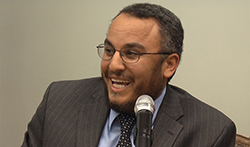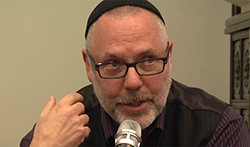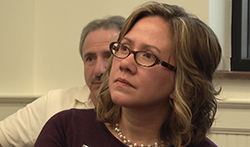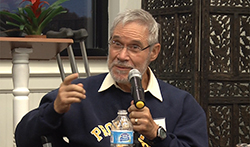"God's Books": Interreligious Dialogue Conference in Murfreesboro, TN
Editor's note: The God's Books conference, held on November 3, 2013, at the Islamic Center of Murfreesboro, was organized with funding provided by an AAR 2013–2014 Regional Development Grant. To learn more about regional grants and to read successful proposals from prior years, visit https://www.aarweb.org/programs-services/regional-development-grants.
On November 3, 2013, nearly 450 people of different faiths gathered at the Islamic Center of Murfreesboro in Murfreesboro, TN, for the first annual "God’s Books" conference. This event was organized by four collaborators: Dr. Ossama Bahloul, imam at the Islamic Center in Murfreesboro; Rabbi Rami Shapiro, noted author, storyteller and scholar of sacred texts; Dr. Ron Messier, archeologist and scholar; and me, Sally Holt, a religion professor. As our group planned this event, we discovered our varying expectations for attendance. We were hopeful that a broad range of people, including religious leaders and scholars, would join us for a conversation about how we read our respective religious texts, but we were also unsure of public interest. In the end, we were overwhelmed with the attendance and the positive dialogue that took place.
The story of how this event came about is one of interreligious dialogue.
The event took place in Murfreesboro, TN about thirty minutes from downtown Nashville. It is a fairly quiet, mid-sized community, home to Middle Tennessee State University. Within the region there are sixteen colleges and universities, including Vanderbilt, Fisk, Belmont, and Lipscomb universities. With so many institutions of higher education in Nashville, one of the city’s nicknames is “Athens of the South.” With so many public lectures to choose from in the community, hearing someone with a PhD speak isn’t necessarily a draw. This event in Murfreesboro was important to those of us who worked to organize it on many levels, and we hoped that some of the public would be interested enough to devote their Sunday afternoon to share in conversation with us.
My interest in interreligious dialogue has shaped, and is fueled by, teaching world religions at Belmont University, a Christian institution in Nashville. Part of Belmont’s mission is to “empower students to engage and transform the world with intelligence, compassion and faith,” so when assigned the task of teaching a course on world religions, I thought carefully about teaching the course in this context. The mission statement seemed a bit overwhelming to me. Belmont’s faculty profess Christianity. I am a Christian, and in order for me to teach world religions with integrity, I decided that I needed to connect with religious leaders in my community in a meaningful way. After all, how could one learn about world religions from sitting in a classroom with a white, Christian woman for an entire semester? I needed to offer my students more. I started to e-mail and call religious leaders in my community, some of whom I knew nothing about, and some of whom were recommended to me by my Belmont colleagues.
This process of connecting with members of my community has been a slow one, but it is a process that has enriched my life as a scholar and a human being more than I could have imagined. By inviting guest speakers to my classes and accepting invitations from various local religious communities who have offered to open their places of worship to us, my students and I have witnessed firsthand the religious diversity of Nashville. These new colleagues have given my students the opportunity to observe religious adherents worshipping in their own contexts and they continue to be an invaluable and gracious resource for me and for my students. Through the semesters, some of the people that responded to my requests for their time and wisdom have become my friends.
 Dr. Ossama Bahloul (Photo Credit: Eddie King) |
 Rabbi Rami Shapiro (Photo Credit: Eddie King) |
 Dr. Sally Holt (Photo Credit: Eddie King) |
 Dr. Ron Messier (Photo Credit: Eddie King) |
This is how I came to know Dr. Ossama Bahloul. I invited him to come speak to my students about Islam. He did so, faithfully and repeatedly. He agreed to come every semester and he spoke not only of Islam, but also shared details about himself and his experiences. He told my students of his first trip to America and about how he felt after arriving in Texas from his Egyptian homeland: He wore a suit on the flight because he was sure Americans wore suits. Through this narrative, Ossama illustrated for students how we really don’t have an opportunity to understand those who are different from us unless we engage with them. He spoke of his American wife, Ivey, and of the importance of reading and knowledge. Over the years, our own conversations ventured to the topics that friends would discuss. As parents we shared common concerns; his baby daughter’s ear infections and his oldest daughter’s love of math. We shared stories about the escapades of our young sons. We became friends.
Throughout this time, Ossama has opened the Islamic Center to visiting groups without fail, and he has done so in a context that has not always proved welcoming to him. Once, he told me a story that illustrated his situation well: He was invited to speak to a group in East Tennessee and while there, a woman continued to press him on why he would not eat pork. He explained the dietary laws of his religion and offered comparisons with kosher rules in Judaism. At the end of the talk, the woman who had questioned him came forward and offered her hand to him in what appeared to be a gesture of kindness. However, when Dr. Bahloul stretched out his own hand to take hers, she placed a pork chop in his palm.
I was saddened when I heard this story. The amount of religious intolerance and the lack of understanding in my own community and in the broader world about various world religions are astounding and often seem insurmountable. Our region has become especially well known for its intolerance toward the Muslim community.
Over the past several years, every mosque in Middle Tennessee has been targeted by vandals and/or threatened in some way. The Islamic Center of Murfreesboro, TN has been targeted numerous times, and the building of this center, completed in July, 2012, caused such an uproar that it drew national attention. The legal maneuvering that took place to keep the Center from being built was well-orchestrated and costly. Featured in articles in the Huffington Post and the subject of a multi-part CNN documentary (Unwelcome: The Muslims Next Door), the Islamic Center has been at the heart of much controversy. Legislation that would have outlawed Sharia law has been proposed by a state senator and a state representative here in TN, though the proposed legislation was defeated. Most recently, plaintiffs have requested that the TN Supreme Court prevent the Islamic Center from expanding its cemetery, even though the congregation has agreed to follow all codes and restrictions.
In the midst of such events, it becomes readily apparent that there is a need to promote understanding and tolerance among adherents of different religious traditions not only in Middle Tennessee but also throughout the United States and the world. As the religious landscape of the United States becomes more diverse, interreligious dialogue becomes more necessary. There is a challenge for religious leaders to model authentic dialogue for community members that will engender a deeper understanding of religious similarities and differences and foster not only tolerance and peaceful cohabitation but also dynamic and productive interfaith communities. The clear lack of understanding in our region served in part as an impetus for the “God’s Books” conference. The need to improve relationships within the Middle Tennessee region became one of the goals of our group. We believed that opening a dialogue among scholars and beyond the campus setting would create an opportunity to strengthen shared religious bonds and clarify where there is common misunderstanding.
What began as a conversation between Dr. Bahloul and me quickly involved another friend and scholar, Rabbi Rami Shapiro. Rabbi Shapiro has worked in interreligious dialogue for years. A writer and speaker, he was the person who first suggested that I contact Dr. Bahloul as a potential guest speaker for my course. Rabbi Shapiro is well known for working with individuals from various faith traditions and has been initiated into a Hindu order as part of his own ongoing spiritual development. As we discussed possibilities about what we would like to do to foster communication in our community, the idea of a conference took hold. We wanted to have an event that would involve challenging ourselves and others to move beyond niceties and discussions of our similarities alone, and that would rather move us toward a conversation that acknowledged our differences and our points of disagreement. We enlisted Dr. Ron Messier, president of the Southeast Regional Middle East and Islamic Studies Seminar (SERMEISS) and director of the Moroccan-American Project in Aghmat, Morocco, to help us organize the event. Ron proved to be an invaluable resource, suggesting ways for us to organize our event, connecting us with other potential guest speakers, and ultimately, serving as moderator for the conference.
The “God’s Books” conference brought together leaders and scholars to model honest, respectful, and productive dialogue in the AAR’s Southeastern Region. Receiving a Regional Development Grant from the American Academy of Religion helped ensure the success of the event and provided much needed funding support. In the end, six speakers came together to talk about how they read their religious texts: Jamal Badawi, an Egyptian Muslim scholar who resides in Canada and is the founder of the Islamic Information Foundation and a member of the Islamic Society of North America; Ossama Bahloul, the imam of the Islamic Center of Murfreesboro; Frederick Bauerschmidt, a Catholic theologian at Loyola University in Baltimore; John Oliver, pastor at St. Elizabeth Orthodox Christian Church in Murfreesboro; Rabbi Rami Shapiro, author and speaker; and me.

From L-R: Sally Holt, Jamal Badawi, Father John Oliver, Ossama Bahloul, Rabbi Rami Shapiro, Frederick Bauerschmidt, Ron Messier (Photo Credit: Eddie King)
People came. Some of us presented our papers. We took a break, and we ate together and mingled with the attendees. The rest of us presented our papers, and then, people stayed. The questions from the audience continued. Even when the event was supposed to be over, people stayed and shared more of their Sunday afternoons with us. Most of the questions were sincere though there were a few questions that seemed to be asked with a goal to provoke. The people who posed those questions failed though, because all of the members of the panel did what we had hoped to do: We agreed and disagreed with each other. We modeled civil discourse and stressed the importance of seeking understanding not only of one’s own religion, but also of the religion of others. We listened to each other and we laughed together. We valued our particularities while we demonstrated community.
There were protestors outside of our event, and the news crews that were there seemed more interested in potential controversy than in what was happening inside. We were not sure what to expect. Some members of the Islamic Center took bottled water out to the protestors, and a few of the protestors eventually came in to listen to our papers. What success! Rabbi Shapiro, in one golden moment, responded to a Christian attendee’s myopic statement about Jesus, asking the attendee to give Jesus more credit and not “dumb down” Christianity. For me, this was evidence that we spoke not only as representatives of our own faith traditions; we spoke in support of one another.
We all left that day feeling that something good had happened. We were encouraged by those in the community who came to dialogue with us, and we were pleased with the tone of the day. It was a day of building relationships, of seeking understanding, and of hope. It is a day we plan to repeat next fall, at our second conference. We are now ready to begin discussing ideas for next year's topic.
Without the support of the American Academy of Religion, we would have had a much more difficult time trying to make all of this happen. The regional grant we received provided funding for travel. It allowed us to purchase food to help create the hospitable and communal environment for our conference. The funds also enabled us to publicize our event to a broader audience. So, thanks to the AAR for making such work possible. These efforts do make a difference, and we hope the effort multiplies!






